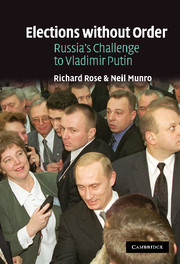Book contents
- Frontmatter
- Contents
- List of figures
- List of tables
- Introduction. The reality of Russia
- 1 A disorderly legacy
- 2 Democratization backwards
- 3 What Russians have made of transformation
- 4 Presidential succession: a Family problem
- 5 Parties without accountability
- 6 A floating system of parties
- 7 Impact of transformation on Duma voters
- 8 From acting to elected president
- 9 Campaigning and governing
- 10 In search of an equilibrium
- Appendix A New Russia Barometer samples
- Appendix B Coding of independent variables
- References
- Index
1 - A disorderly legacy
Published online by Cambridge University Press: 22 September 2009
- Frontmatter
- Contents
- List of figures
- List of tables
- Introduction. The reality of Russia
- 1 A disorderly legacy
- 2 Democratization backwards
- 3 What Russians have made of transformation
- 4 Presidential succession: a Family problem
- 5 Parties without accountability
- 6 A floating system of parties
- 7 Impact of transformation on Duma voters
- 8 From acting to elected president
- 9 Campaigning and governing
- 10 In search of an equilibrium
- Appendix A New Russia Barometer samples
- Appendix B Coding of independent variables
- References
- Index
Summary
The past is the logical starting point for any evaluation of change, but there is no agreement about which past is important in Russia today. The legacy of the past contains a plurality of protean traditions, and in total their implications are ambiguous. In the days of the Soviet Union, the Communist Party explicitly repudiated the tsarist past, and films and operas were carefully scrutinized by Joseph Stalin's cultural commissars to ensure that no unflattering parallels were drawn between terrible times under the tsars and Stalin's rule. Western Sovietologists were free to draw parallels emphasizing continuities and many did. Some went so far as to argue that there is an inherent tendency in Russian culture to accept authority and little or no desire for freedom in the Western sense. Stalin's successors have repudiated his legacy and had their own legacy repudiated too.
The treble transformation that created the Russian Federation shows that, even though the legacy of the past constrains choices, it does not determine the flow of events. Mikhail Gorbachev's efforts to reform the Soviet system were not so much a turning point as a breaking point, for a party-state that had enjoyed a monopoly of power for two-thirds of a century collapsed. The end of the power of the Communist Party of the Soviet Union caused the implosion of a non-market economy in which bureaucrats commanded what was produced. The attack on Gorbachev's reforms by Boris Yeltsin led to the destruction of the Soviet Union.
- Type
- Chapter
- Information
- Elections without OrderRussia's Challenge to Vladimir Putin, pp. 16 - 40Publisher: Cambridge University PressPrint publication year: 2002



